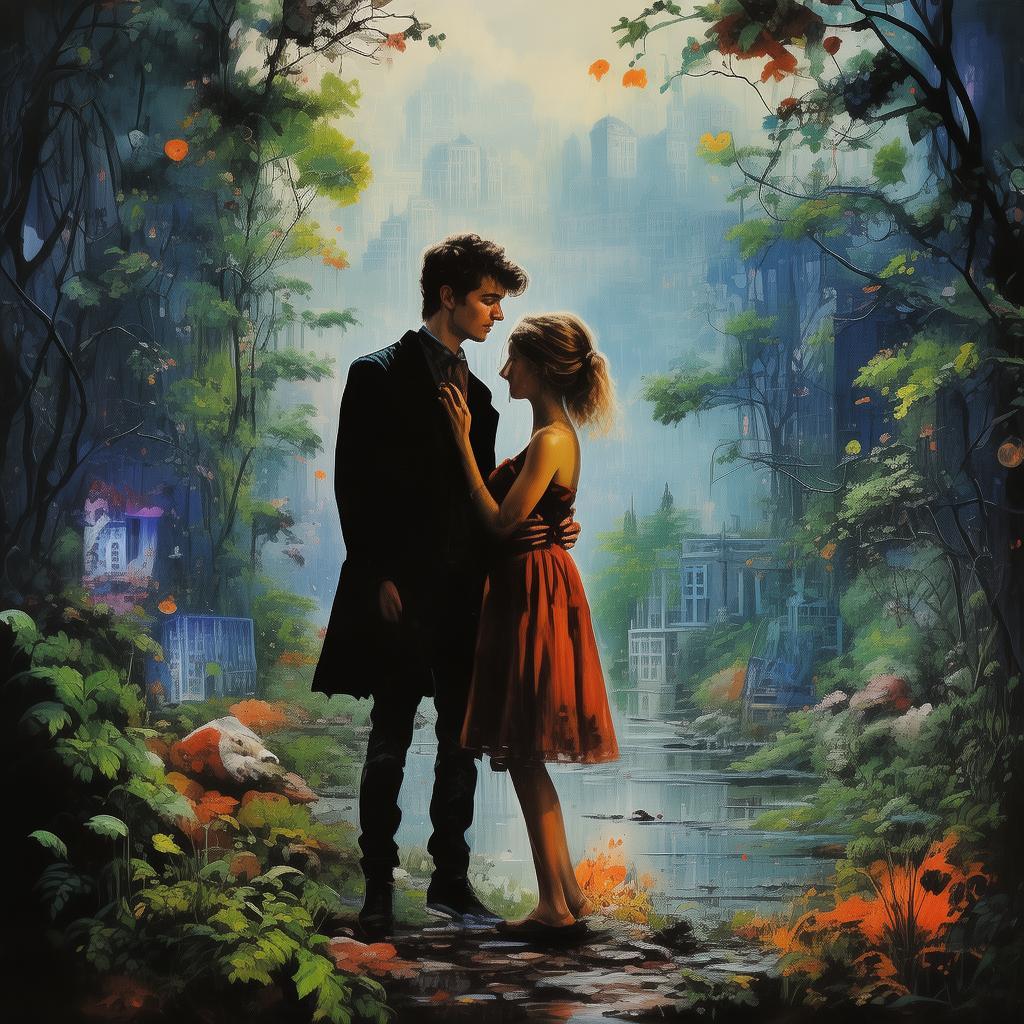Whispers of a Tattered Tunic: A Love Lost and Found
In the dimly lit studio of the dilapidated theater, a single spotlight shone on the solitary figure on stage. He was a man of few words, his presence commanding the attention of the sparse audience. His name was Alexander, a name as common as his struggle to make it as an actor in the harsh world of the theater. But what set Alexander apart was the tattered tunic he wore, a tunic that seemed to carry the weight of a thousand silent stories.
The tunic was a relic of his past, a symbol of a love that had faded with the passing years. It was a gift from Eliza, a woman who had once believed in Alexander's dreams as fiercely as he believed in them himself. Yet, their love was as ephemeral as the smoke from a dying candle, vanishing in the breath of fate.
Alexander's story began years ago, in the vibrant heart of the city where dreams were as abundant as the stars in the night sky. Eliza had been his muse, her laughter the melody that echoed through the empty rooms of his makeshift dressing room. But the world of theater was a cruel one, and as time wore on, Eliza's heart turned to stone. Alexander's dreams crumbled like the dust from the stage curtains.
The tunic became his only link to the woman he once loved. It was a reminder of the love he had lost and the dreams he had allowed to slip through his fingers. Every night, as he took the stage, he would don the tunic, feeling the weight of unspoken words and the weight of a love that was now just a memory.
One evening, as the curtain drew back, a young woman named Clara took her place in the spotlight. She was a fresh talent, her eyes brimming with the promise of a future filled with applause. Alexander watched her, a spark of envy dancing in his eyes as he remembered Eliza's youth and energy.
Clara, however, had a secret of her own. She had grown up in the shadow of the theater, her mother once a celebrated actress whose life had ended in tragedy. Clara had inherited her mother's love for the stage, but her heart was heavy with the weight of her mother's sorrow and the fear of following in her footsteps.
Intrigued by Alexander's silent vigil, Clara approached him after the performance. "I see you wear that tunic every night," she said, her voice tinged with curiosity.

Alexander looked at her, a storm of emotions swirling in his eyes. "It's a reminder of the love I lost," he replied, his voice barely a whisper.
Clara nodded, her eyes softening. "I understand loss, too. My mother was an actress, and her love for the stage was her life. But it was also her burden."
The two found solace in each other's company, sharing stories of their pasts and dreams. They discovered that despite the years that had passed and the paths that had diverged, they shared a common bond—a love for the theater and a deep understanding of the weight of unrequited dreams.
As their friendship blossomed into something more profound, Alexander began to wonder if perhaps he could find a way to bridge the gap between his past and his future. The tunic, which had once been a symbol of his sorrow, now became a symbol of hope. He decided to create a play that would tell the story of his love for Eliza, of his dreams, and of the sacrifices he had made.
Clara, with her natural talent and passion, agreed to star in the production. The theater, once a place of sorrow and solitude for Alexander, became a beacon of hope and inspiration. The audience, too, felt the pull of the tunic's story, and the play became an unexpected sensation.
The night of the play's opening, the theater was filled to capacity. Alexander took the stage, wearing the tunic as he had every night before. As he began to speak, the audience held their breath, waiting for the story that had been so long in the telling.
"Once upon a time," Alexander began, "there was a man who loved a woman with all his heart. He gave her a tunic, a symbol of his love and his dreams. But time passed, and their love faded, leaving only the tunic to remind him of what once was."
As he spoke, Alexander's voice grew richer, more expressive. The audience was drawn into the story, their emotions mirroring his own. Then, as if by magic, the spotlight shifted to Clara, who took her place on stage as Eliza.
Clara's performance was breathtaking, her voice resonating with the passion of a woman who had once believed in love. As she sang the last note, the theater erupted in applause. Alexander, standing off to the side, felt a wave of emotion wash over him. It was as if Eliza's spirit had come to life, standing before him, once again.
In the aftermath of the play's success, Alexander and Clara's relationship deepened. They discovered that love, like the tunic, can be worn, can be shared, and can be transformed into something new. Alexander realized that his love for Eliza had not been a loss but a gift—a gift that had brought him to Clara and to a new beginning.
As the final curtain fell on the play, Alexander took off the tunic and handed it to Clara. "This is yours now," he said, his voice filled with warmth and gratitude.
Clara smiled, her eyes sparkling with tears. "It's more than a tunic, Alexander. It's a reminder of the love we have found together."
And so, the tattered tunic, once a symbol of a love lost, became a symbol of a love found and shared. Alexander and Clara's story became one of redemption and hope, a testament to the power of love and the beauty of second chances.
✨ Original Statement ✨
All articles published on this website (including but not limited to text, images, videos, and other content) are original or authorized for reposting and are protected by relevant laws. Without the explicit written permission of this website, no individual or organization may copy, modify, repost, or use the content for commercial purposes.
If you need to quote or cooperate, please contact this site for authorization. We reserve the right to pursue legal responsibility for any unauthorized use.
Hereby declared.









